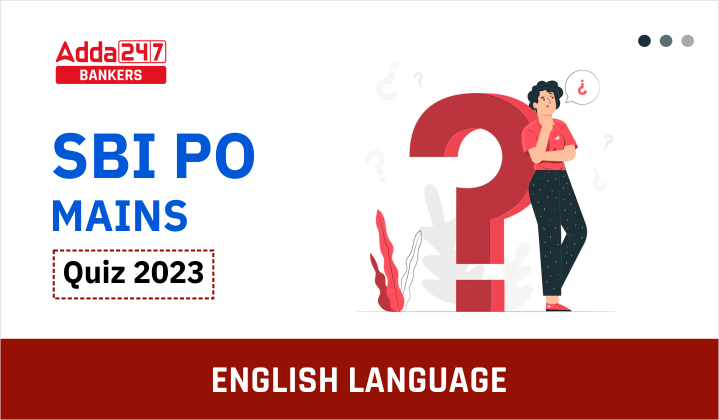Directions (1-5): In each of the following questions a short passage is given with one of the lines in the passage missing and represented by a blank. Select the best out of the five answer choices given, to make the passage complete and coherent (coherent means logically complete and sound).
Q1. Except it be a lover, no one is more interesting as an object of study than a student. Shakespeare might have made him a fourth in his immortal group. The lunatic with his fixed idea, the poet with his fine frenzy, the lover with his frantic idolatry, and the student aflame with the desire for knowledge are of “imagination all compact.” To an absorbing passion, a whole-souled devotion, must be joined an enduring energy, if the student is to become a devotee of t_he gray-eyed goddess to whose law his services are bound.__________________
(a) Here again the student often resembles the poet—he is born, not made.
(b) Like the quest of the Holy Grail, the quest of Minerva is not for all.
(c) No human being is constituted to know the truth, the whole truth, and nothing but the truth.
(d) Only by keeping the mind plastic and receptive does the student escape perdition.
(e) None of these.
Q2. I had known the Russian quarter for many years before it interested me. It was not until I was prowling around on a Fleet Street assignment that I learned to hate it. A murder had been committed over a café in Lupin Street; a popular murder, fruity, cleverly done, and with a sex interest. Of course every newspaper and agency developed a virtuous anxiety to track the culprit, and all resources were directed to that end._______________________
(a) Thomas Burke, a young newspaper man in London, came into quick recognition with his first book, Nights in Town (published in America as Nights in London) in 1915.
(b) So it was that the North Country paper of which I was a hanger-on flung every available man into the fighting line, and the editor told me that I might, in place of the casual paragraphs for the London Letter, do something good on the Vassiloff murder.
(c) I cursed news editors and all publics which desired to read about murders.
(d) Journalism is perhaps the only profession in which so fine a public spirit may be found.
(e) None of these.
Q3. Until I met the Butlerians I used to think that the religious spirit in our times was very precious, there was so little of it. I thought one should hold one’s breath before it as before the flicker of one’s last match on a cold night in the woods. “What if it should go out?” I said; but my apprehension was groundless. It can never go out. __________________
(a) The religious spirit is indestructible and constant in quantity like the sum of universal energy in which matches and suns are alike but momentary sparkles and phases.
(b) What makes the Butlerian cult so impressive is, of course, that Butler, poor dear, as the English say, was the least worshipful of men.
(c) This great truth I learned of the Butlerians.
(d) Denied contemporary renown, he had firmly set his heart on immortality, and quietly, persistently, cannily provided for it.
(e) None of these.
Q4. They talk of the candle-power of an electric bulb. What do they mean? It cannot have the faintest glimmer of the real power of my candle. It would be as right to express, in the same inverted and foolish comparison, the worth of “those delicate sisters, the Pleiades.” That pinch of star dust, the Pleiades, exquisitely remote in deepest night, in the profound where light all but fails, has not the power of a sulphur match; yet, still apprehensive to the mind though tremulous on the limit of vision, and sometimes even vanishing, it brings into distinction those distant and difficult hints—hidden far behind all our verified thoughts—which we rarely properly view. I should like to know of any great arc-lamp which could do that. So the star-like candle for me. No other light follows so intimately an author’s most ghostly suggestion. We sit, the candle and I, in the midst of the shades we are conquering, and sometimes look up from the lucent page to contemplate the dark hosts of the enemy with a smile before they overwhelm us; as they will, of course.________________
(a) That is why nothing can compare with the intimacy of candle-light for a bed-book.
(b) Like me, the candle is mortal; it will burn out.
(c) It is a living heart, bright and warm in central night, burning for us alone, holding the gaunt and towering shadows at bay.
(d) As the bed-book itself should be a sort of night-light, to assist its illumination, coarse lamps are useless.
(e)None of these.
Q5. About once in so often you are due to lie awake at night. Why this is so I have never been able to discover. It apparently comes from no predisposing uneasiness of indigestion, no rashness in the matter of too much tea or tobacco, no excitation of unusual incident or stimulating conversation. In fact, you turn in with the expectation of rather a good night’s rest. Almost at once the little noises of the forest grow larger, blend in the hollow bigness of the first drowse; your thoughts drift idly back and forth between reality and dream; when—snap!—you are broad awake!______________
(a) For, unlike mere insomnia, lying awake at night in the woods is pleasant.
(b) Hearing, sight, smell—all are preternaturally keen to whatever of sound and sight and woods perfume is abroad through the night; and yet at the same time active appreciation dozes, so these things lie on it sweet and cloying like fallen rose-leaves.
(c) Perhaps the reservoir of your vital forces is full to the overflow of a little waste; or perhaps, more subtly, the great Mother insists thus that you enter the temple of her larger mysteries.
(d) Always they lay soft velvet fingers on the drowsy imagination, so that in their caressing you feel the vaster spaces from which they have come.
(e) None of these
Directions (6-15): Read the following passage carefully and answer the questions given below. Certain words/phrases have been printed in bold to help you locate them.
During World War II, an inventor submitted a scheme for building a giant airship armed with death rays to the British government. He had provided details of the engines, navigational systems, etc. When questioned about the death-rays themselves he exclaimed, “Oh, I thought the military had plenty of them available.”
If a robotics defined, provisionally, as a machine made in the image of man then it must be stated that, like death-rays in 1940, robots in 1990 remain in the world of speculation not as established fact. Yet just as the inventor took the existence of death rays for granted and concentrated on putting them to use, the popular imagination has been much more pre-occupied by the question of what we should do when robots do arrive, than with the business of actually making them. It is rather as if the Wright brothers’ first fight had been preceded by an extensive literature on air traffic control.
The prevailing image of the robots as a walking, talking mechanical man is firmly established in our consciousness. It is worth pondering how this notion, a hypothesis, took on so vivid a form. There are, it is true, machines in existence which we have, perhaps rather prematurely, categorized as robots. But long before even this primitivevanguard became a practical proposition, the idea of the robot was enjoying a lively existence in human imagination. It seems to have been around even before it gained a name. Other inventions had to take concrete shape before a name was found for them. It took some time for the English speaking world to agree that the ‘horseless carriage’ should be a motor car or a ‘flying machine’ an airplane. Yet when Karol Capac published his play RUR (for ‘Rossum’s Universal Robots’) the obscure word was quickly and universally adopted. It means no more than ‘serf’ in the Czech language, Capek’s ‘robots’ were but the last in the line of mechanical men, and all that the concept had lacked was a label.
Now, some seventy years on, when their real-life counterparts are only just undergoing their birth pangs, fictional robots are as familiar in our imaginative lives as cops and robbers, or cowboys and Indians. Many a hero of contemporary space opera would be as lost without a robot companion as the Lone Ranger without Topton or Holmes bereft of Watson. Writers of science fiction had seen very early that the robot had possibilities that many other technological paraphernalia lacked. Spaceships and time travel only moved old plots. But alien beings and robots, like jokers in the pack could be used to produce an entirely new game. The robot was not a prop, but a character. It could play a Watson to human Holmes, and it also had potential in the role of Holmes himself. What we see of real robots indicates that ‘machine in the image of man’ is a misleading description. But the image is still zestfully utilized in science fiction. The robot is in a limbo between man and machine, and is thus the ideal dramatic device for exploring the profoundly metaphysical issue of the relationship between the two. It can stand for all machine kind which twentieth century man has come to see as the threat to all mankind. Therein lies its appeal to serious science fiction writers who aim at more than entertainment.
Q6. According to the author, the people in general are convinced that
(a) ‘a machine made in the image of man’ is a useful working definition of robot.
(b) robots will become a reality in a few years.
(c) death rays and robots are clearly a part of speculative world.
(d) the actual construction of robots will take many more years of persistent efforts.
(e) sensible people should not take questions like if and when about robots seriously.
Q7. The author compares the hypothetical literature on air traffic control with
(a) people current preoccupation with how to deal with robots when we encounter them.
(b) the elaborate technical details that those working on robots must attend to.
(c) the regulation that will be necessary to protect robots from industrial espionage.
(d) the British inventor’s plan for the proposed airship.
(e) the convention among science fiction writers to create a complete selling for their new gadgets and characters.
Q8. The author of this paragraph, through the story of the inventor in Britain, desires to illustrate the point that
(a) scientists and inventors usually have a very further imagination.
(b) adults, and not only children, can develop an absorbing interest in fantastic weapons.
(c) speculation and hypothesising are well known and necessary aspects of inventions.
(d) people sometimes fail to distinguish between what is well known but imaginary and what is fact.
(e) the emerging field of robotics will bring the province of speculation and that of established fact together.
Q9. In contrast to the horseless carriage and the flying machine, the mechanical man
(a) has been created in many forms by inventors in many countries.
(b) was a well understood and familiar concept long before the name ‘robot’ was used.
(c) has an ancient and mythical origin.
(d) was initially conceived of a slave or worker with very limited function.
(e) was popularized in drama and fiction in the English speaking world.
Q10. The stories of Holmes, Lone, Ranger etc. are mentioned in order to point out that
(a) the heroes of popular space age science fiction have robot companions like Watson, Tonton.
(b) the heroes of popular space age science fiction are robots and are remarkable characters like Holmes.
(c) a pair of robots (hero and companion) is becoming the typical characters in science fiction.
(d) cops and robbers, and cowboys and Indians are being presented in an entirely new form in science fiction.
(e) the prototypical robot character in science fiction is loyal and persistent apart from being intelligent.
Q11. Though the walking talking man model of the robot is misleading, it persists in science fiction because
(a) science fiction by definition distorts reality.
(b) the ability to talk gives them the potential to deal with metaphysical issues that science fiction explores.
(c) authors want the robot to be the symbol of all machine kind.
(d) the image is so strong that readers especially will feel lost if it is changed.
(e) the man and machine image has dramatic potential that serious writers find attractive.
Q12. The expression “Primitive vanguard” refers to
(a) primitive man’s belief in being with strange powers
(b) myths and legends in which robot like creatures feature
(c) simple mechanical devices loosely labeled as robots
(d) ideas in the human imagination that lead eventually significant discoveries
(e) the whole range of inventions that form the basis of modern technology
Q13. In the realms of science fiction, mechanical men have been treated differently from other technological paraphernalia because
(a) they could conveniently be used like the joker in the pack of cards.
(b) they could be characters in their own right and not only be props.
(c) they could easily move from one setting in space or time to another.
(d) they could help answer metaphysical questions beyond the reach of human characters.
(e) distinguished writers wanted to use them to make science fiction serious and educative.
Q14. The ‘horseless carriage’ and the ‘flying machine’ are examples of
(a) inventions that were created to meet social needs.
(b) inventions that were neglected during the lifetime of their inventors.
(c) inventions that were given names only after they had become a part of common experience.
(d) machine that are called robots without proper justification.
(e) high practical devices that are not associated with speculation and imagination.
Q15. According to passage, Capek’s play RUR is of special interest because
(a) it provided an account of Capek’s struggle to construct a mechanical man.
(b) it transformed Capek who was an engineer into a famous playwright.
(c)it showed that science and technology were quite advanced in Czechoslovakia by about 1920.
(d)it gave the name ‘robot’ to the familiar notion of a mechanical man.
(e)it was the first great work of science fiction.
Solutions
S1.Ans.(b)
Sol. In the last sentence of the question we have: To an absorbing passion, a whole-souled devotion, must be joined an enduring energy, if the student is to become a devotee of the gray-eyed goddess to whose law his services are bound.The part in bold and italics speaks of devotion; option (b) takes the idea forward by saying that ‘the quest of Minerva is not for all’. Minerva is the Roman Goddess of wisdom; and the student who is in search of knowledge must please the goddess. Option (b) takes the idea in the right direction.
S2.Ans.(d)
Sol.
The last line of the paragraph says: Of course every newspaper and agency developed a virtuous anxiety to track the culprit, and all resources were directed to that end.We must ask is this a good thing or not? If every newspaper directs its energy to track the culprit, then why should the author curse the editors and the public? Option (c) goes out.
The passage is not about Thomas Burke, so option (a) goes out. Option (d) is the right answer because the idea discussed in the last sentence is ‘Of course every newspaper and agency developed a virtuous anxiety to track the culprit’. The word ‘virtuous’ must help us choose (d).
S3.Ans.(a)
Sol. The last few sentences of the passage speak about the religious spirit. The last two sentences have ‘it’. They refer to the ‘religious spirit’. Option (a) is the right answer as it takes the idea forward in the right direction. Many of you might mark (c), but the ‘this’ in option (c) would refer to what. In the previous two sentences, we speak of ‘religious spirit’; and in the last sentence we speak of ‘this’ which we ourselves don’t know. Option (a) takes the idea in the right direction and is, therefore, the right answer.
S4.Ans.(b)
Sol.
The clue to the answer lies in the last line of the paragraph: We sit, the candle and I, in the midst of the shades we are conquering, and sometimes look up from the lucent page to contemplate the dark hosts of the enemy with a smile before they overwhelm us; as they will, of course. The author says that the enemy will eventually overwhelm us. Option (b) in this case makes complete sense. The author has been positively reflecting on the intimacy he has with his candle.
S5.Ans.(c)
Sol.
The great Mother insists thus that you enter the temple of her larger mysteries. The author in the passage discusses why he is wide awake; he is about to fall asleep, but then he finds himself wide awake. Option (c) comes up with the reasons for that, and the option has the right reasons too. Option (c) says ‘the vital forces are full to the overflow’, which means you are so full of vitality that you must just not fall asleep. Option (a) unnecessarily introduces a new idea: the woods.
S6. Ans. (e)
Sol. Refer the second-last sentence of the second paragraph, “Yet just as the inventor took the existence of death rays for granted and concentrated on putting them to use, the popular imagination has been much more pre-occupied by the question of what we should do when robots do arrive, than with the business of actually making them.” Hence (e) is the correct option in the context of the passage.
S7. Ans. (a)
Sol. Refer the second paragraph of the passage, “Yet just as the inventor took the existence of death rays for granted and concentrated on putting them to use, the popular imagination has been much more pre-occupied by the question of what we should do when robots do arrive, than with the business of actually making them. It is rather as if the Wright brothers’ first fight had been preceded by an extensive literature on air traffic control.” It can be inferred from this paragraph that the correct option for the given question is (a).
S8. Ans. (d)
Sol. The inventor thought the imaginary death rays to have been existing already.
S9. Ans. (b)
Sol. Refer the opening sentences of the third paragraph.
S10. Ans. (e)
Sol. These heroes would not have achieved their feat without their robot companions.
S11. Ans. (d)
Sol. Refer the third-last sentence of the passage.
S12. Ans. (b)
Sol. ‘Vanguard’ means leading character in a movement or opinion.
S13. Ans. (b)
Sol. Refer “The robot was not a prop but a character…”
S14. Ans. (c)
Sol. Refer “It took some time …an airplane.” (Third paragraph)
S15. Ans. (d)
Sol. Refer the last sentence of the third paragraph.





 Indian Air Force से SBI Clerk तक: जानिए ...
Indian Air Force से SBI Clerk तक: जानिए ...
 SBI PO Exam Date 2026 - जानिए साल 2026 म...
SBI PO Exam Date 2026 - जानिए साल 2026 म...
 IBPS Clerk Result 2026 OUT: Mains Exam क...
IBPS Clerk Result 2026 OUT: Mains Exam क...










